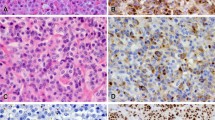Abstract
PURPOSE: This study assessed the role of prolactin in patients with Dukes B and C colorectal carcinoma. METHODS: Circulating prolactin and carcinoembryonic antigen were assayed using immunoradiometric assay and radioimmunoassay kits, respectively, in preoperative blood (n=98) and tumor-draining venous blood (n=34) samples of colorectal carcinoma patients. Immunohistochemical localization of prolactin (n=98), carcinoembryonic antigen (n=98), and prolactin receptors (n=56) was performed. The expression of prolactin messenger ribonucleic acid (n=50) and prolactin receptor messenger ribonucleic acid (n=50) was studied by reverse transcriptase polymerase chain reaction. Further, prolactin amplimer was sequenced. RESULTS: Preoperative prolactin and carcinoembryonic antigen levels were significantly higher in patients with colorectal carcinoma than in controls (prolactin,P=0.001; carcinoembryonic antigen,P=0.0001). Univariate survival analysis showed that Dukes stage, histologic grade, and circulating prolactin were significant prognostic factors for determining overall survival (Dukes stage,P=0.00001; histologic grade,P=0.005; prolactin,P=0.001). In multivariate analysis, besides Dukes stage, circulating prolactin emerged as the most significant independent prognostic factor influencing overall survival. Preoperative prolactin levels showed excellent significant correlation with response to therapy and progression of disease. A significant tenfold higher mean concentration of prolactin was observed in tumor-draining venous blood than in peripheral blood (P=0.0001). Diffuse cytoplasmic staining for prolactin was seen in 51 percent (50/98) of the colorectal carcinomas. Prolactin messenger ribonucleic acid expression was seen in 88 percent (44/50) of the colorectal carcinomas. Sequence analysis of the 234-bp prolactin amplimer revealed that the sequence was homologous to exon 5 of pituitary prolactin messenger ribonucleic acid. CONCLUSION: These multiple approaches confirmed that prolactin is produced by colorectal carcinoma cells. Looking at its prognostic value and correlation with disease activity, it may provide new insights into treatment for patients with colorectal carcinoma.
Similar content being viewed by others
References
Shaw-Bruha CM, Pirrucello SJ, Shull JD. Expression of the prolactin gene in normal and neoplastic human breast tissues and human mammary cell lines: promoter usage and alternative mRNA splicing. Breast Cancer Res Treat 1997;44:243–53.
Ozarda AT. Prolactin-secreting tumors. J Surg Oncol 1983;22:9–10.
Rees LH, Bloomfield GA, Rees GM, Corrin B, Franks LM, Ratcliffe JG. Multiple hormones in a bronchial tumor. J Clin Endocrinol Metab 1974;38:1090–7.
Turkington RW. Ectopic production of prolactin. N Engl J Med 1971;285:1455–8.
Stanisic TH, Donovan J. Prolactin secreting renal cell carcinoma. J Urol 1986;136:85–6.
Hsu C-T, Yu M-H, Gregory Lee C-Y, Jong H-L, Yeh M-Y. Ectopic production of prolactin in uterine cervical carcinoma. Gynecologic Oncol 1992;44:166–71.
Hoffman WH, Gala RR, Kovacs K, Subramanian MG. Ectopic prolactin secretion from a gonadoblastoma. Cancer 1987;60:2690–5.
Bhatavdekar JM, Patel DD, Giri DD,et al. Comparison of plasma prolactin and CEA in monitoring patients with adenocarcinoma of colon and rectum. Br J Cancer 1992;66:977–80.
Patel DD, Bhatavdekar JM, Ghosh N,et al. Plasma prolactin in patients with colorectal cancer: value in follow-up and as a prognosticator. Cancer 1994;73:570–4.
Dukes CE, Bussey HJ. The spread of rectal cancer and its effect on prognosis. Br J Cancer 1958;12:309–20.
Morson BC, Sobin LH. International histological classification of tumours. Vol. 15. Geneva: World Health Organization, 1976.
Bhatavdekar JM, Patel DD, Ghosh N,et al. Coexpression of Bcl-2, c-Myc, and p53 oncoproteins as prognostic discriminants in patients with colorectal carcinoma. Dis Colon Rectum 1997;40:785–90.
Chomczynski P, Sacchi N. Single-step method of RNA isolation by acid guanidinium thiocyanate-phenolchloroform extraction. Anal Biochem 1987;162:156–9.
Bhatavdekar JM, Patel DD, Vora HH, Shah NG, Chikhlikar PR, Ghosh N. Prolactin as a local growth promoter in patients with locally advanced tongue cancer: GCRI experience. Head Neck 2000;22:257–64.
Sambrook J, Fritsch EF, Maniatis T. Analysis and cloning of eukaryotic genomic DNA. In: Nolan C, ed. Molecular cloning—a laboratory manual. New York: Cold Spring Harbor Laboratory Press, 1989:9.1–9.62.
Ilan Y, Sibirsky O, Livni N, Gofrit O, Barack V, Goldin E. Plasma and tumor prolactin in colorectal cancer patients. Dig Dis Sci 1995;40:2010–5.
Molitch ME, Schwartz S, Mukherji B. Is prolactin secreted ectopically? Am J Med 1981;70:803–7.
Peyrat JP, Djiane J, Bonneterre J,et al. Stimulation of DNA synthesis by prolactin in human breast tumor explants. Relation to prolactin receptors. Anticancer Res 1984;4:257–62.
Berwaer M, Martial JA, Davis JR. Characterization of an up-stream promoter directing extrapituitary expression of the human prolactin gene. Mol Endocrinol 1994;8:635–42.
Author information
Authors and Affiliations
Additional information
Supported by a grant from the Department of Science and Technology of India.
About this article
Cite this article
Bhatavdekar, J.M., Patel, D.D., Chikhlikar, P.R. et al. Ectopic production of prolactin by colorectal adenocarcinoma. Dis Colon Rectum 44, 119–127 (2001). https://doi.org/10.1007/BF02234833
Issue Date:
DOI: https://doi.org/10.1007/BF02234833




